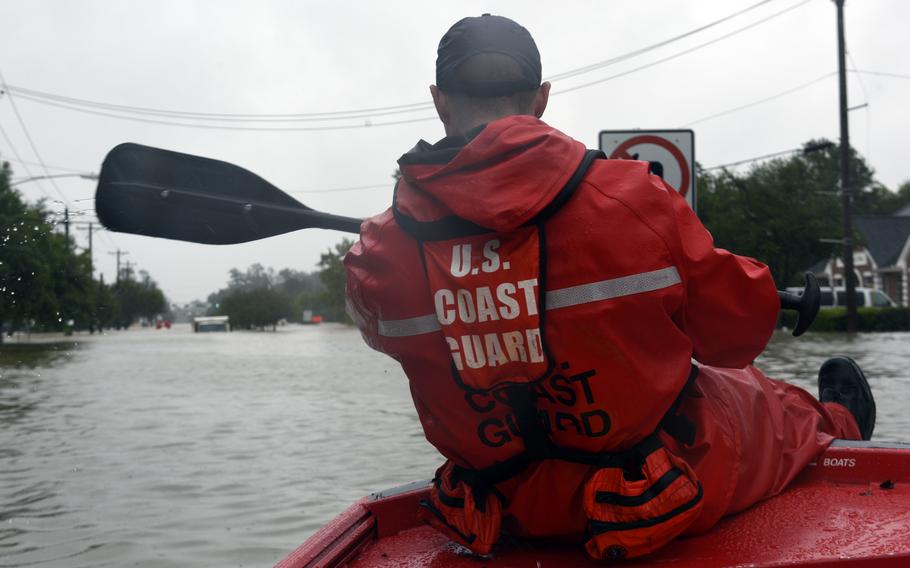
Coast Guard Chief Petty Officer Stephen Kelly helps launch a 16-foot flood punt boat to conduct urban rescues in Friendswood, Texas, Aug. 29, 2017, in the wake of Hurricane Harvey. (Corinne Zilnicki/U.S. Coast Guard)
With its motto Semper Paratus — always ready — the U.S. Coast Guard consistently lives up to its commitment to “stand the watch” and fulfill the mission. A recent incident involving a Coast Guard Air Station Houston helicopter crew, which swiftly rescued a tanker crewman 10 miles off the coast of Galveston, Texas, is a poignant reminder of the life-saving efforts carried out daily by Coast Guardsmen.
During the last government shutdown, which spanned from December 2018 through January 2019, members of only one branch of the armed forces — the Coast Guard — worked without paychecks for 34 days, oftentimes alongside service members who were still being paid. While Coast Guardsmen protected our maritime borders from illegal immigration, drugs and foreign vessel incursions, some of their families were resorting to food pantries and short-term loans to pay for housing.
If past shutdowns are any indicator, a potential future shutdown will include legislation to protect the paychecks of members of the Department of Defense. But, unless we do something differently, that legislation would exclude the service that defends Americans right here at home — the U.S. Coast Guard — because it is housed within the Department of Homeland Security rather than the Defense Department.
In 2019, Congress faced a similar situation. The Defense Department was funded, but the Homeland Security Department was not, so I joined with several Senate colleagues to advance a bill that would have treated members of the Coast Guard the same as those in the Air Force, the Army, the Navy and the Marine Corps. This bill was brought up before the entire U.S. Senate by a process called unanimous consent, which has many advantages, but risks getting blocked by a single senator. In that case, the senator who blocked this legislation was the Democratic Leader, Chuck Schumer. The only thing that was necessary to ensure the timely payment of every Coast Guard service member during the last shutdown was for Democratic senators to withdraw their objection. They would not.
As ranking member of the Senate Commerce Committee, which has responsibility for policies affecting Coast Guard service members and their families, I believe that in the event of a shutdown the Coast Guard must be paid — without question and without delay. That’s why I recently introduced the bipartisan Pay Our Coast Guard Act, which would treat Coast Guardsmen the same as all other service members for purposes of pay and benefits in the event of a shutdown.
This week I spoke on the Senate floor requesting unanimous consent to pass the Pay Our Coast Guard Act, which I introduced with Sens. Maria Cantwell, D-Wash., Dan Sullivan, R-Alaska, and Tammy Baldwin, D-Wis. But our bill was again blocked by Senate Democratic leadership. Regrettably, the Coast Guard is being taken hostage in a shutdown fight.
I believe in limited, responsible government, and I do not take government shutdowns lightly. It is my sincere hope that Congress will pass fiscally responsible bills to fund certain government operations. However, if there is a temporary lapse in appropriations, I firmly believe that the Coast Guard must be funded. Unfortunately, just as in 2019, Democrats are content to play politics with the livelihoods of Coast Guard families.
The Coast Guard plays a pivotal role in our national security: safeguarding ports, patrolling waterways, and ensuring threats from illicit trafficking, smuggling and terrorism are detected and neutralized. This mission is critical in an era where transnational criminal organizations and hostile actors seek to exploit vulnerabilities in our defenses. A shutdown that hampers the Coast Guard’s ability to carry out its duties puts our national security at risk.
Furthermore, the Coast Guard is vital to border security efforts, stopping those who use the sea as a conduit for illegal activities. We have witnessed a surge in these types of threats. In 2022 alone, the Coast Guard interdicted over 400,000 pounds of narcotics and conducted over 12,000 illegal alien interdiction operations, an increase of over 350% from 2021.
In recognition of this extraordinary work, this year I introduced a resolution honoring the efforts of the Coast Guard for excellence in maritime border security, which the Senate passed in July.
Cutting off Coast Guard funding during a shutdown weakens our ability to effectively secure our borders.
Beyond its security functions, the Coast Guard is a first responder to maritime disasters and emergencies. Whether it’s a boating accident, a natural disaster or an oil spill, the Coast Guard is often the first on the scene, providing aid to those in distress. Coast Guard men and women put themselves in harm’s way to keep us safe. Their rapid response capabilities save lives and protect our environment.
Many of us in Texas and along the Gulf Coast saw the incredible heroism of the Coast Guard in the wake of Hurricane Harvey in 2017, during which so many courageous Coast Guard personnel risked their lives to save others. From Corpus Christi to Galveston to South Padre Island and beyond, Coast Guard service members are willing to make the ultimate sacrifice when their nation calls. We should pay the Coast Guard, and that ought to be something that commands unanimous, bipartisan support.
Sen. Ted Cruz, a Texas Republican, is ranking member of the Senate Commerce Committee, which has responsibility for policies affecting Coast Guard service members and their families.